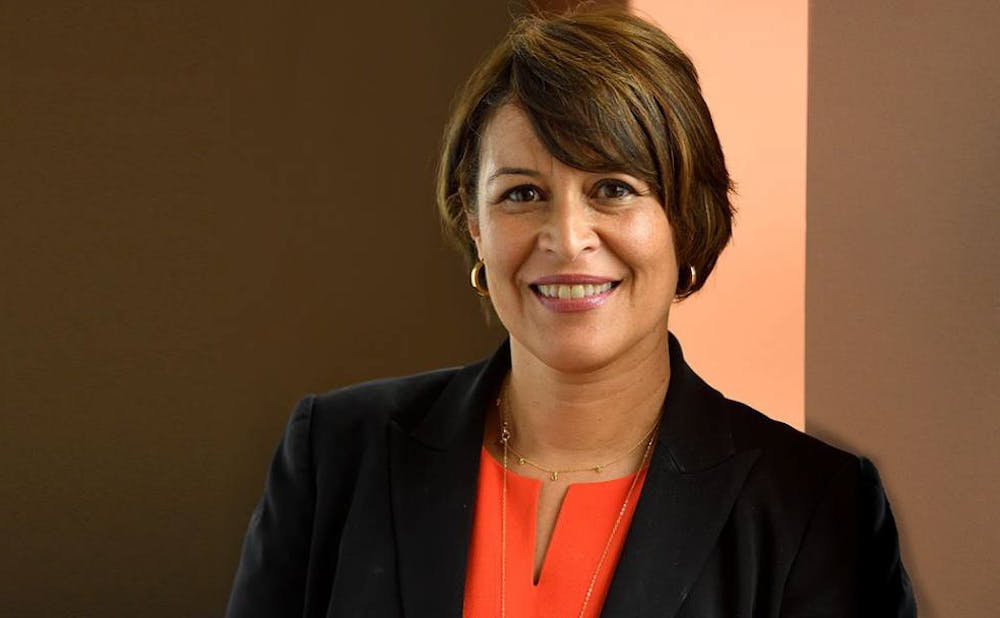Kimberly Hewitt was reappointed to a second five-year term as vice president for institutional equity and chief diversity officer, according to an announcement from President Vincent Price last week.
Hewitt has led the Office of Institutional Equity, which “works to promote equal opportunity and campus diversity,” since August 2019. The office also “monitors compliance with University policies and federal, state and local laws concerning nondiscrimination, equal opportunity and affirmative action.”
Hewitt’s reappointment followed a regular review of her tenure by an eight-person committee of senior faculty and campus leaders chaired by Abbas Benmamoun, vice provost for faculty advancement.
“I am excited to work and be a part of a community that remains dedicated to creating equitable systems and accessible opportunities for all,” Hewitt wrote in a June 23 email to The Chronicle.
Hewitt’s responsibilities include overseeing the development of educational material for students, addressing misconduct and discrimination concerns and supporting equitable and diverse hiring, advancement and retention practices throughout the University.
“Kim is an outstanding leader who fosters excellence by advancing equity and inclusion and supporting all members of the Duke community in reaching their full potential,” Price said.
In her first term, she revamped OIE’s organizational structure and led policy changes to improve the efficiency of responses to discrimination and harassment complaints, including the institution of a new OIE Liaison program.
Hewitt also spearheaded the development of the Campus Culture Survey, a university-wide effort to gauge progress toward creating a “welcoming, supportive and equitable campus environment.” First administered in 2021, the 2024 version raised concerns from students and faculty about the survey’s methodology and efficacy.
Hewitt co-chairs the Racial Equity Advisory Council, where she helped introduce the Duke Annual Report on Racial Equity in June 2022. The report provided recommendations for “integrating racial equity in operations and efforts across the [University] enterprise” through campus climate and assessment, infrastructure and policies, communications, and education.
“Colleagues throughout the University rely on Kim for her wise counsel and her thoughtful and effective approaches to institutional equity, and I am delighted that she will continue to serve the University in this capacity,” Price said.
Before coming to Duke, Hewitt was the vice provost for institutional equity at Johns Hopkins University from 2017 to 2019. She previously served as director of the Office for Equal Opportunity and Affirmative Action and deputy chief of staff for the Office for Equity and Diversity at the University of Minnesota.
Hewitt holds a bachelor’s degree from Stanford University and a Doctor of Law from the University of Minnesota Law School. She has 14 years of experience practicing employment, labor and education law.
DEI at Duke
Hewitt will continue her work to promote diversity, equity and inclusion efforts at Duke amid a changing higher education landscape.
DEI initiatives have been under attack around the country in recent years as conservative activists and Republican politicians have moved to abolish related offices and programs at public colleges and universities.
Notably, the Supreme Court’s June 2023 ruling overturning race-based affirmative action has revolutionized college admissions — and placed other diversity initiatives in jeopardy.
In the wake of the ruling, Duke discontinued its Reginaldo Howard Memorial Scholars Program in April, which covered full tuition, room and board costs for “top applicants of African descent.” The scholarship has been replaced by the Reginaldo Howard Leadership Program, which is open to all undergraduate students regardless of race.
Current Reggie Scholars expressed frustration at a lack of communication from the University amid the program’s end.
Some of Duke’s graduate and professional schools have also faced challenges in response to the ruling. Duke Law School made changes to its application process for the 2023-24 admissions cycle, replacing a diversity statement with one to two short essays responding to a range of prompts. The School of Medicine released a statement in March denying allegations that admissions standards had been lowered to prioritize DEI goals in new student recruitment.
The University received pushback last year for alleged discrimination on a number of subjects outside of race-based concerns.
In September, a legal activist filed a federal complaint against the University’s Alice M. Baldwin Scholars program, arguing that the program for female-identifying students engaged in “reverse discrimination” in violation of Title IX provisions.
The same month, a New York Times article named Duke among some of the “least economically diverse” institutions of higher education, noting that the University fell substantially behind top-ranked peer institutions.
Price responded to the piece and maintained that while there was room to improve, work was already underway to advance socioeconomic diversity and the article painted Duke “in a rather harsh light.” However, first-generation and low-income students and alumni drew on personal experiences to express support for the article’s claims.
The University faced further backlash surrounding its decision to change the timeline for releasing merit scholarship decisions. In January, the Office of University Scholars and Fellows informed current merit scholars that the University would move to a post-matriculation model of selection — notifying students after the deadline to enroll had already passed.
In response to concerns raised about the financial burden the new timeline could place on families, OUSF moved the notification date for finalists up to April 29 — two days before the enrollment deadline. However, finalists would not be informed whether they actually received a scholarship until mid-June, eliciting further frustration.
The future of DEI in higher education
The University of North Carolina system recently removed a key DEI policy following an April vote of the Board of Governors’ University Governance committee. The move set up the elimination of several DEI-related administrative positions and offices at public universities across the state.
While the policy change does not affect Duke as a private institution, students expressed concerns that the move represents a growing trend throughout higher education which could soon impact the University.
In observation of Juneteenth, Price released a statement last week reaffirming Duke's “ongoing commitment to racial and social equity.”
“In this moment when efforts to advance diversity, equity and inclusion nationally are being questioned — and in some cases curtailed — let me be clear in reaffirming Duke University’s unwavering commitment to attaining true excellence in our core missions of education, research and clinical service by advancing racial and social equity and living up to our values by being a welcoming and inclusive community that supports all people in reaching their full potential,” he wrote.
The University president listed a number of recent advances made in DEI goals, which he referred to as “significant gains,” while still acknowledging that Duke has “a long way to go as a campus, university and society.”
“Leading the Office for Institutional Equity is a responsibility I deeply value,” Hewitt wrote in the June 23 email. “While there is still much work to be done, I am proud of what we have achieved so far and look forward to working with the entire community to continue moving forward together.”
Get The Chronicle straight to your inbox
Signup for our weekly newsletter. Cancel at any time.

Zoe Kolenovsky is a Trinity junior and news editor of The Chronicle's 120th volume.

